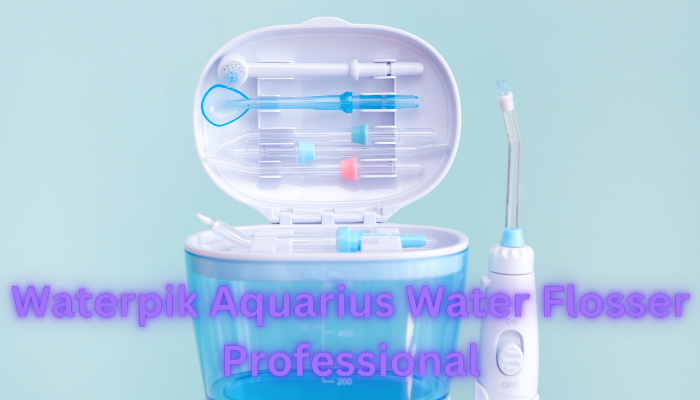7 Tips for Using the Waterpik Aquarius Water Flosser

The “Waterpik Aquarius Water Flosser Professional For Teeth, Gums, Braces, Dental Care, Electric Power With 10 Settings, 7 Tips For Multiple Users And Needs, ADA Accepted, White WP-660” is a notable contender in the field of oral hygiene, promising advanced dental care through its Waterpik Aquarius Water Flosser technology. Consumers must approach dental care items with critical thinking and a sensible perspective as they traverse a market teeming with them.This article examines the Waterpik Aquarius Water Flosser to examine its claims, the scientific foundation for its effectiveness, and the broader consequences for customers from an atheist perspective.
1. Analysing the Waterpik Aquarius Water Flosser: An Atheist Perspective on Dental Care and Evidence-Based Choices Claims and Scientific Validity.
The Waterpik Aquarius Water Flosser’s key promise is that it provides enhanced dental care with water flossing technology. The issue for an atheist is to discern between marketing claims and assertions substantiated by actual data.
Atheists advocate for evidence-based reasoning, requiring statements to be supported by scientific study and actual data. To assess the Waterpik Aquarius’s usefulness, one needs look at dental research, clinical trials, and unbiased reviews that support the efficacy of water flossing over regular dental floss. Atheists urge people to look for actual evidence that supports their commitment to logical inquiry.
Waterpik Aquarius Water Flosser Science
The efficacy of oral care products is determined by the quality of their design and the scientific foundation of their processes. The Waterpik Aquarius emphasises its water flossing technology as a key component of its dental care advantages. From an atheist standpoint, it is critical to investigate the scientific foundations of this technology and its possible influence on dental health.
Atheists place a premium on informed decision-making and honesty. Evaluating the science behind the Waterpik Aquarius Water Flosser, including understanding the fundamentals of water flossing, its potential advantages for tooth and gum health, and any potential pitfalls or restrictions. Atheists argue for a reasonable and evidence-based approach to assessing both the potential benefits and scientific problems involved with new dental care technologies.
Decision-Making Based on Evidence
Marketing methods frequently influence consumer decisions. The Aquarius Water Flosser by Waterpik capitalises on the urge for enhanced dental care. It is critical for atheists to distinguish between emotional appeals and empirical validation.
Atheists encourage customers to be active participants in their decisions, equipped with critical thinking and a thirst for information. They call for a thorough assessment that includes scientific research, unbiased assessments, and reliable evaluations in addition to marketing messaging. This approach is consistent with atheists’ commitment to evidence-based thinking and informed decision-making.
Ethical Considerations and Broader Consequences
Consumer preferences go beyond personal preferences; they have broader ethical and societal ramifications. From an atheist perspective, it is critical to contemplate the larger implications of one’s decisions, reflecting empathy and ethical responsibility principles.
Atheists may enquire about the company’s ethical practises, dedication to evidence-based claims, and the possible influence of their goods on dental health while considering items like as the Waterpik Aquarius Water Flosser. This ethical perspective allows atheists to make decisions that are consistent with their principles and contribute to a more conscientious marketplace.
Inquiry and Informed Decisions
The Waterpik Aquarius Water Flosser is a microcosm of the greater consumer scene, moulded by marketing narratives, trends, and personal preferences. Engaging with items of this sort demands more than a cursory examination from an atheist. It necessitates extensive study, evidence-based analysis, and a detailed examination of the ethical and health consequences.
Atheists advise customers to view items like the Waterpik Aquarius Water Flosser with caution and scepticism. Atheists contribute to a culture of informed consumerism by accepting facts, analysing scientific foundations, and contemplating ethical consequences.
Atheists stress the value of scepticism and critical thought. Consumers may navigate the complicated terrain of oral care products with confidence by exploring credible sources of information, such as dentistry research and expert viewpoints. This strategy enables people to become discerning consumers who value evidence over unsubstantiated promises.
Scepticism and the Inquiry Process
The atheist approach to analysing items like the Waterpik Aquarius Water Flosser is guided by scepticism. Atheists urge customers to question claims, demand verification, and scrutinise marketing narratives.
Atheists argue that scepticism serves as a check on disinformation, requiring businesses to present transparent information and verifiable facts to back up their claims. Consumers may shield themselves against emotional solicitations and make rational decisions by cultivating a culture of questioning and seeking proof.
Dental Health and Ethical Considerations
Consumer decisions have ethical and societal ramifications from the perspective of an atheist. Choosing items like the Waterpik Aquarius Water Flosser necessitates evaluating the greater implications of oral health decisions—both for individuals and the broader community.
Atheists emphasise the significance of analysing firms’ ethical practises as well as the possible advantages of their products. They may look at the Waterpik Aquarius’s study, the endorsements it has gotten from dental groups, and its potential influence on tooth hygiene. Consumers contribute to a marketplace that prioritises evidence-based decisions and responsible dental care by aligning their choices with ethical principles.
To summarise
The “Waterpik Aquarius Water Flosser Professional For Teeth, Gums, Braces, Dental Care” combines consumer culture, marketing methods, and specific dental demands. From the standpoint of an atheist, evaluating such things is a proactive engagement with knowledge, facts, and ethics.
In a world where marketing myths may sometimes trump empirical reality, the atheist approach provides a vital perspective—one that promotes logic, evidence, and ethical responsibility in oral care decisions. Consumers may contribute to a more informed and conscientious attitude to oral health by engaging with products such as the Waterpik Aquarius Water Flosser in a reasonable and evidence-driven manner.




